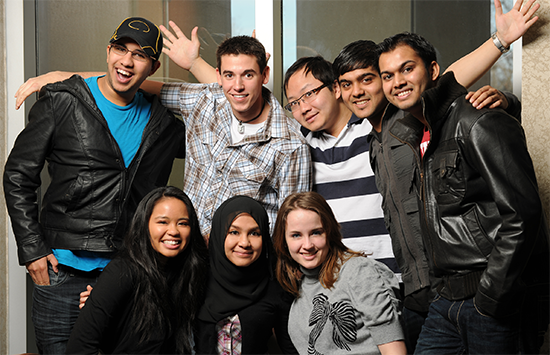
August-September 2018
Driving
Discipleship
Home
------------------
|






Yasmine's Story
By Mandi Morgan
It was the last class of the day. The university professor finished her lesson and began to introduce a project. A group project, specifically, a 15-minute presentation and major research paper would take the place of a final exam. As the professor continued detailing her expectations, the students feverishly took notes. The bell sounded. Then one of the girls in our class leaned over and asked if she could be in our group.
To say we were stressed would be an understatement. The stress wasn’t just coming from the project though. Neil and I were taking full-time university classes in Spanish, parenting three little girls, each with her own homework and afterschool activities, teaching English conversation classes at the university, and actively ministering in the local church. On top of all this, Neil started having health problems. He was undergoing tests, daily physical therapy, and nearly constant
doctor appointments.
Now, one of our classmates wanted to work on a project with us. This meant coordinating schedules, when ours were already full and finding suitable meeting places.
We agreed, somewhat reluctantly, for her to work with us and invited her over to our house later that week to begin.
The following day, Neil received a phone call from David, a missionary from England living in Madrid and working with university students. We had met with David several months earlier to discuss the possibility of beginning a work with university students in our city of Alcalá de Henares. We put that ministry idea on hold due to the timing and craziness of our schedules.
David began to tell Neil he had received an email from an American professor teaching at a university in China. One of her previous students, now studying at the University of Alcalá, was having a hard time. In fact, this student was battling extreme depression and experiencing suicidal thoughts. David continued describing the bleak situation and asked if we could locate and minister to this girl in some way.
Obviously, we understood the seriousness of the situation and wanted to help. Yet, how could we locate one girl in the middle of a university of nearly 26,000 students? The task seemed nearly impossible.
Neil asked David to give us her name. We would do what we could to locate her. Several Chinese students were in a few of our classes. We could start by asking if they knew her. The conversation went something like this:
Neil: “Tell me her name, and we’ll see what we can do.”
David: “Sounds great. Her name is Yasmine.”
Neil: “What? What did you say her name was again?”
David: “Yasmine.”
Neil: “I don’t believe this. We know her. She’s in our class. She actually sits right beside us. She just asked if she could work with us on our major year-end project. She’s supposed to come to our house tomorrow.”
We immediately saw God’s hand in the situation and began to pray for our classmate. She came to our house, and we did everything we could to make her feel welcome. Our kids played with her. Our dog loved her. We ate. We laughed. We worked. We talked. And talked. And talked.
As we spent many, many days and hours working on this project together, she began to open up about her struggles. We made sure she saw a doctor. We checked on her regularly. We tried to help provide for not only her emotional needs but her spiritual ones as well. One day, as she sat at our table talking, Neil straightforwardly asked, “Yasmine, do you believe there is a God?” She sat in silence for a moment, thinking, and then responded, “I do believe there is a God. I just don’t know his name.” We were able to tell her the name above all names, the name of Jesus. We shared our personal testimonies with her.
The end of the semester approached. Our small group completed our research paper analyzing the economic and ecologic impact of tourism on Costa Rica. The day of our presentation came and all went smoothly. We made an A on both parts.
We learned far more from that project than the importance of tourism for Costa Rica. We learned about the struggles many international students face as they live abroad. Yasmine’s struggles are a common occurrence. International students often have academic, social, and emotional difficulties that frequently lead to depression.
More often than not, international students study in a second language. Their work is graded against the work produced by native speakers. Many have financial difficulties since they face restrictions regarding where they can work. They struggle against prejudices and stereotypes. For many of these students, their study abroad is the first time they have been away from their families. They find themselves alone. They find it difficult to make friends in the new country, so often mingle with students from their own country. This makes adapting to the new culture more difficult. They miss their food, their holidays, their weather, and their rhythm of life. They can’t go home on short breaks throughout the semester, and the time zone differences make communication with their families even harder. All of this leads many international student to feel isolated. This isolation, and the discouragement that comes with it coupled with academic pressures and further amplified by financial struggles and cultural rubs, quickly leads to depression.
According to one source, in May 2017, 1.18 million international students studied in the United States. Many of these students struggle silently. For example, in a mental health survey done at Yale University among Chinese students, nearly 45% experienced symptoms of depression, and nearly 27% were unaware of any available counseling services. These students need to be pointed to professional counselors, but they also need love, acceptance, and social interaction. In addition to their emotional needs, many of these students come from countries with little to no gospel witness.
International students represent a huge mission field in our own backyard. They present a wonderful opportunity for churches to minister to these students in towns and cities across America. With such an opportunity at our doorstep, we can be missionaries without learning another language or crossing a border. As George Barna once said, “In His wisdom and compassion, God has brought the mission field right to our door and affords us the outreach opportunities of a lifetime.”
About the Writer: Mandi Morgan and her family live in Alcalá de Henares, Spain, where they assist pastor José Manuel in the Esperanza Church. Mandi and Neil also teach English classes through the University of Alcalá and encourage and help the church with multiple outreach opportunities. Learn more:
www.fwbgo.com.

Tips for Ministering to International Students
We have a wonderful opportunity to minister to international students, but where do we start? The answer is simple: just be a friend. Here are a few hints and tips for reaching out:
-
Share your culture. Most international students want to learn about the culture in which they are living. Invite them to community and church events such as Thanksgiving dinners, Easter plays or cantatas, July 4th picnics, backyard cookouts, local town or state fairs, etc.
-
Show interest in their culture. If you know nothing about their culture, a little research would be beneficial. Then, ask questions and listen. Try their food. Ask about their music, their holidays, their family, their favorite places, and their religion.
-
Be available. When someone moves to a new country, they don’t know many things. For example: where can you find the cheapest groceries, where is the best place to get a haircut, where is a good doctor’s office, etc.
-
Encourage their English. It is much easier for international students to hang around others who speak their native language, especially if they lack confidence in their English abilities. Encourage them. Help them if they ask. If they are having trouble understanding, slow your speech down, but not in a demeaning manner and don’t start speaking louder.
|
|

